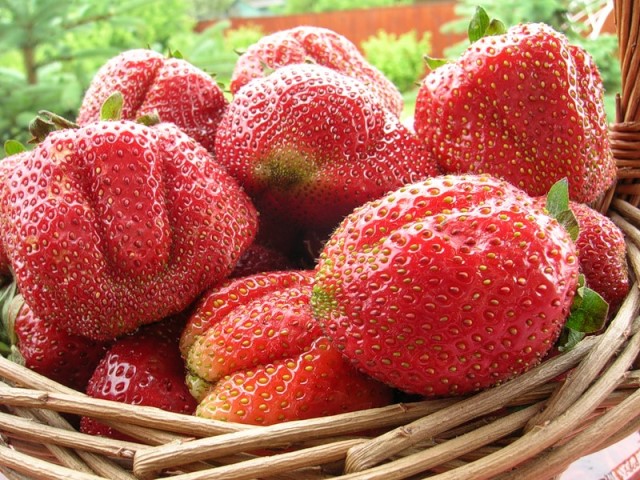Many are looking forward to the beginning of summer, during this period, you can heartily taste delicious berries, the name of which is strawberry. If you believe the historians of its homeland is America, but nowadays it is grown around the globe, not excluding Siberia. For this region, gardeners-breeders have brought a lot of different varieties that stand up to all weather difficulties and continue to enjoy the rich crops. In this article we will talk about the description of the first-grader variety, find out where and how this delicious berry grows.
Table of contents
History varieties First grader
Strawberry has spread rapidly around the world. because of its very tasty berries. Now there are many varieties of it, most of which can adapt to different weather conditions. But there are also those that will grow and bear fruit only under certain weather conditions, such as the First Grader, a variety of strawberries, bred specifically for the West-Siberian region of the Russian Federation.
The shtamb was bred a little more than a quarter of a century ago by the breeders of the Barnaul scientific research institute Zabelina and Stolnikova. It is based on two varieties “Fairy” and “Torpedo”, it was they who endowed the First Grader variety with a large number of excellent characteristics.
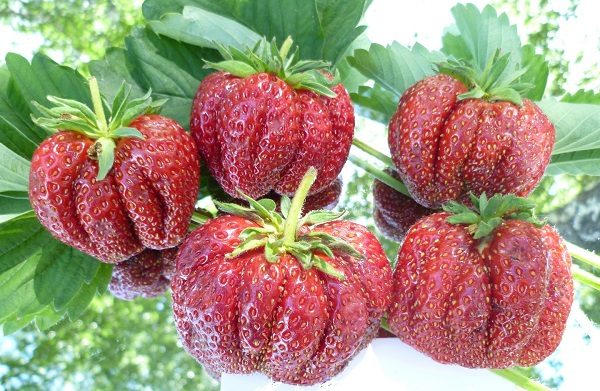
Description
Strawberry variety First Grader has large erect busheswhich can reach 30 cm in height. In diameter, the adult plant is about 40 cm.
There are many leaves in the rosette; they are large, have a dark green color of the plates and are covered with a waxy coating.At the edge of each there are glad teeth with a slight waviness.
Stems of peduncles thick, pubescent, slightly inclined to the ground. Each has several buds. The flowers are creamy pink, round, large and have a bisexual structure. Flowering does not occur simultaneously.
Fruits have a conical shape with a blunt end; across the entire surface of the berry there are grooves characteristic of this particular variety. The ripeness is determined by the saturated red color of the fruit with a burgundy shade inside the ribs.
Flowering and ripening berries
A first grader pleases with flowering about ten days, the beginning of this period usually falls on the end of May.
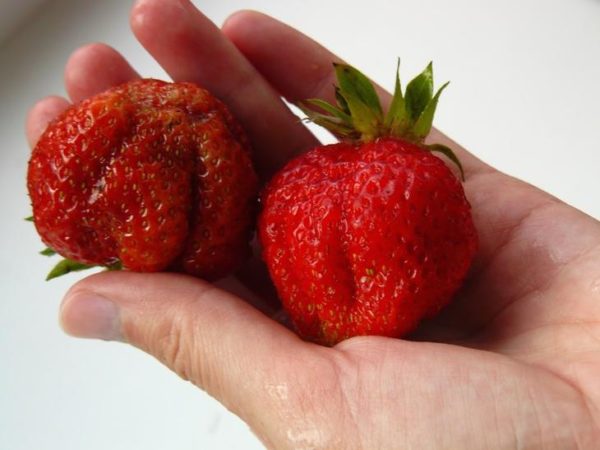
The ripening of the first fruits will begin at the end of June, the fruiting period of the variety is long, up to seven full harvests of fragrant berries can be harvested during the season. Strawberry variety First grader has good yields, with proper care from 1 hectare up to 800 kg of high quality berries can be harvested.
High fruiting will last 4-5 years, then yields will begin to fall. In order to continue to harvest the rich harvests of the old shtamb replace the younger.
Winter hardiness
Saplings of a grade differ in high endurance, both frosty winters, and in droughty summer. The tests showed that the frost at -33 ° C with seven centimeters of strawberry snow cover is not terrible. Under such conditions, the leaves that had completely departed in the spring, the peduncles and tendrils did not suffer at all were slightly frozen.
Climatic conditions
The first-grader variety of strawberries is best suited to the climate of Western Siberia, it was developed for this particular region. A milder climate will not have a positive effect, the berries are crushed under the scorching sun and completely lose their original taste.
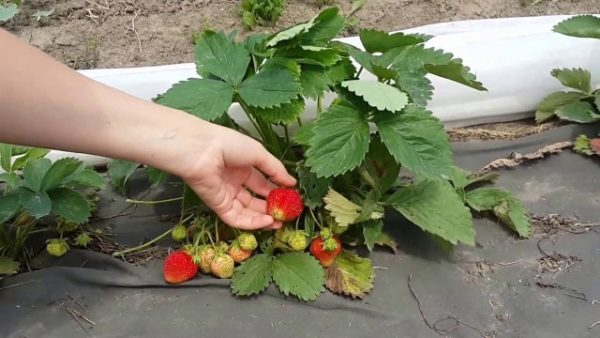
Advantages and disadvantages
Strawberries for Siberian gardeners have a number of advantages:
- This variety has a high yield.
- Good disease and pest resistance is noted, with proper care.
- The fruits have great taste.
- The high level of winter hardiness, the bushes withstand even a strong decrease in temperature with minimal snow cover.
- The variety is drought tolerant, although crop quality will decline.
- Transportability of harvested berries at the highest level.
Like all berries, the variety has several drawbacks:
- The fruits are ripen gradually, harvesting can be carried out up to seven times per season.
- Rainy weather reduces disease resistance, berries are often affected by gray rot.
But high yields and excellent taste of ripe berries overlap all these inconveniences.
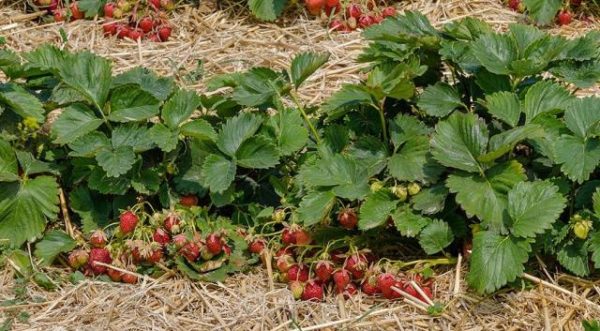
Landing
Gardeners know that it is better to plant strawberries at the site in autumn, so that before the first frosts, young bushes could take root. In the spring, they will delight the eye with flowering, and after a while the first harvest will appear.
Landing is also possible in the spring, but for this it is necessary to carry out preparatory work in advance:
- The selected piece of land is being dug up.
- Make organic or mineral fertilizers.
- Liberally watered every two to three days.
When the plot is prepared, and the last frost moved away, planting of seedlings can be carried out.
Selection of planting material
So that the plant quickly got accustomed and began to actively develop it is worth taking for planting young shoots not older than two years.The ideal option would be those that the gardener himself selected on his site.
If seedlings are bought on the market or in a specialty store, you should pay attention to such trifles:
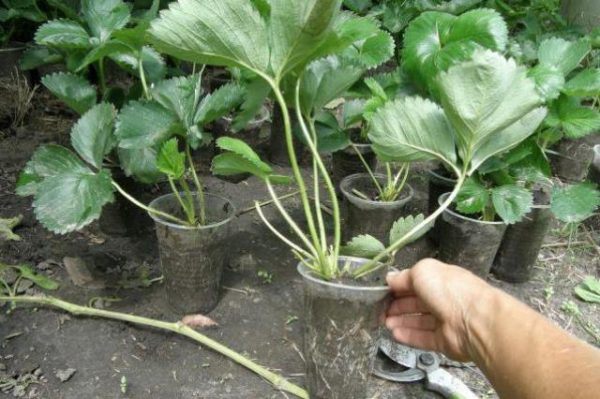
- Attentively look at the strawberry of this honeycomb for the offered goods, the young growth has a light small root.
- Select seedlings with a well-developed root system.
- Each bush should have 3-4 leaves and a well-developed central bud.
It is these indicators that will allow you to purchase high-quality planting material, which will soon delight you with lush green foliage and rich harvest.
Choosing a landing site
Strawberries of this variety grow well in open sunny places, but the penumbra will not affect the development and yield. If you plant the bushes completely in the shade, the quantity and quality of the harvested berries will be worse.
Soil for a first grader any suitable, the main criteria will be:
- sufficiently moist;
- not overdried;
- well fertilized.
Before planting, dry soil is watered abundantly, but wet is allowed to dry.
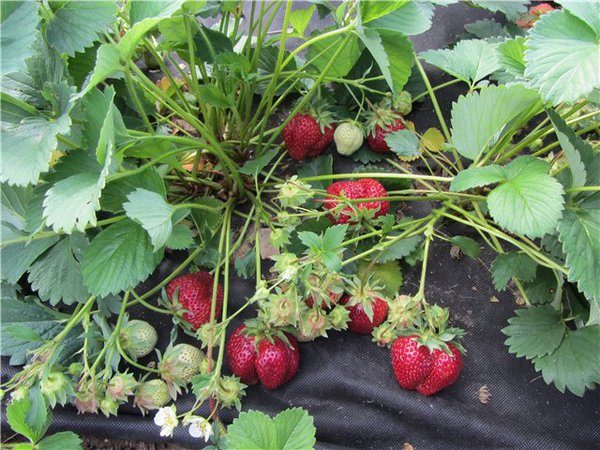
Landing
Two hours before planting, they prepare the soil, apply a bucket of humus to each square meter of land, and 70 g of universal fertilizer and dig it well. The process itself will be:
- at a distance of 30 cm from each other make holes;
- they put selected strawberry seedlings;
- water them, slightly smooth the rhizome;
- when the water completely enters, the root is sprinkled with earth, this should be done so that the kidney remains completely above the ground.
The aisles must be at least 50 cm in order for the moss grower to freely pass between them. The process itself is best carried out in overcast weather, an idea over the bushes you need to create a partial shade.
Care
In order for the saplings to grow strong and delight them with an annual rich harvest, they need to ensure proper conditions. An adult plant will also require attention and care.
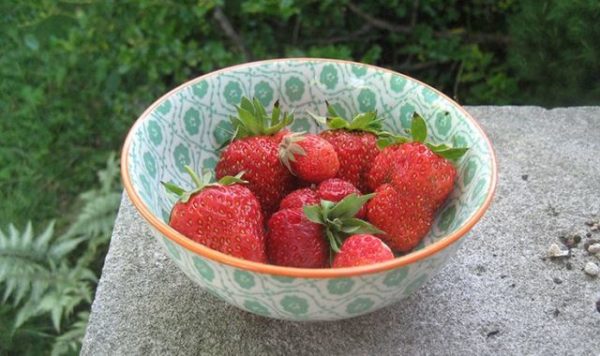
- In the first year after disembarking, the antennae and flower stalks are completely removed and the root system is strengthened.
- Immediately after wintering strawberries need nitroammofoska, bring it in the form of an aqueous solution.Prepare it at the rate of a tablespoon on a bucket of water.
- Before the start of flowering, fertilize with ash, chicken manure or saltpeter.
- After harvesting, the above-ground part of the plant is cut off and once again fed up with a nitroammofosca, only now 2 tablespoons are taken on a bucket of water.
- In late August, make the last fertilizer, urea is diluted in water and watered the whole bed. The solution is prepared from 30 g of substance and a bucket of water.
Fertilizers will provide normal development of bushes of an adult plant and a sapling.
In addition, strawberries need pruning, e carried out as needed:
- yellow leaves;
- leaves dry;
- Bush lets a lot of mustache.
On dry areas, it is necessary to mulch with hay or sawdust to help preserve moisture for the roots and protect the berries from contact with the ground and moisture on it. In the spring mulch must be removed and, if necessary, put a new one.
Watering strawberries should also be in moderation so as not to harm the roots and the future harvest. The first watering is usually carried out at the end of April, when all the frosts are gone. 10–12 l of warm distilled water is sufficient per square meter, if the soil is sufficiently wet the amount of water is reduced to 6 liters.Frequency of watering once or twice in ten days.
During the hot and dry summer, the beds with strawberries are watered twice a week early in the morning, preferably before sunrise.
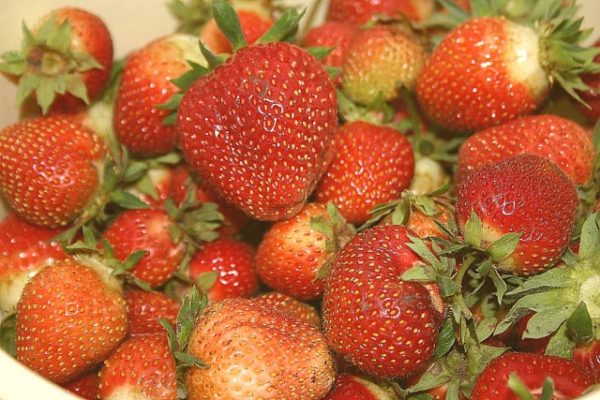
Breeding
The strawberry variety First grader is propagated only by a mustache, sowing seeds does not guarantee the safety of all varietal characteristics.
In order to rejuvenate the bed notice and leave large shoots, the rest are removed. After 3-4 leaves appear on the sprout, the mustache is cut off and transplanted to a permanent place.
Diseases and pests
First grader is not afraid of pests and diseases, but in a rainy summer, gray leaf rot and fruit can strike, which is impossible to fight.
To prevent the disease, mulching is carried out and the berries are placed on a layer of hay or sawdust and do not touch the ground.
Strawberry variety First grader grows well and bears fruit in the Siberian region, the main thing is to provide care and you will always be with a rich harvest of fragrant berries.
